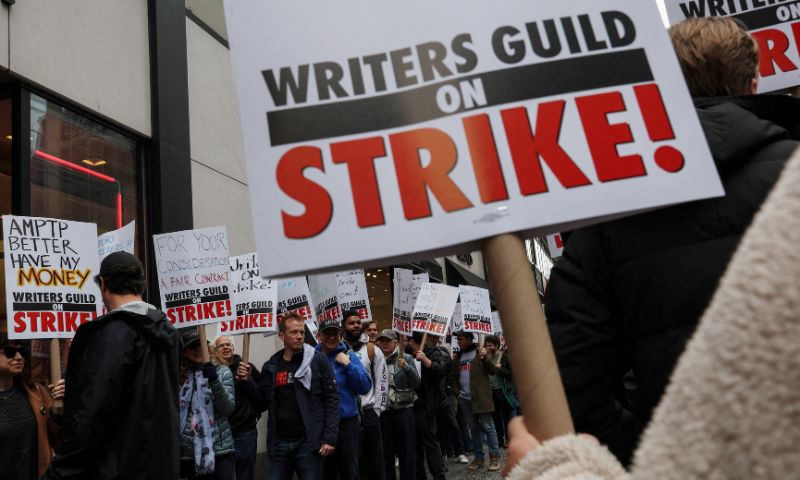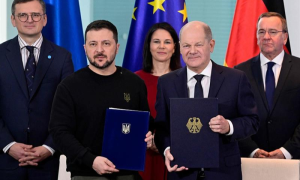LOS ANGELES: Hollywood writers, for decades, have been penning science fiction scripts about robots taking over the world, but they are now fighting to prevent robots from taking their jobs.
The Writers Guild of America (WGA) is attempting to limit the use of AI in writing film and television screenplays. Hollywood studios have rejected that idea, stating they would be open to discussing new technologies once a year. Hollywood studios are fighting to make streaming services lucrative amidst declining ad income.
The Alliance of Motion Picture and Television Producers is negotiating the deal on behalf of the studios; however, its spokeswoman declined to comment on the issue.
Hollywood’s motion picture and television screenwriters went on strike on Monday, the first such action in the industry in 15 years, as they expressed concerns over the use of AI.
Although the issue was one of the last items on the WGA summary of negotiating points, many of which focus on improving compensation in the streaming era, the debate over AI’s role in the creative process would determine the future of entertainment for decades to come.
The WGA negotiating committee member and screenwriter John August stated that authors had two reservations about AI.
He said, “We don’t want to provide them with our content or edit their shoddy first drafts.”
Hollywood is using AI to sketch animated short films with the help of OpenAI’s Dall-E, which can produce realistic visuals, smooth out an actor’s liberal use of f-bombs, and remove wrinkles from an actor’s ageing face. Scriptwriting is a new experience for some writers.
‘LAST BASTION’
“The problem here seems to be that we thought that creativity, per se, was the last bastion, the line in the sand, that would stop machines from replacing someone’s job,” said Mike Seymour, co-founder of Motus Lab at the University of Sydney, who has a background in visual effects and artificial intelligence and has advised several studios. “I’d argue that’s just some kind of arbitrary idea people had that caught the public’s attention,” you say.
Seymour said that AI may aid authors in overcoming “the blank piece of paper phenomenon” and is adept at creating what he terms “pantomime,” or stark, direct communication that lacks subtlety.
Seymour said, “I’m also not suggesting that AI will become really brilliant and create, you know, ‘Citizen Kane,’ because it simply isn’t right.
Writers worry that they will be underutilised or at the very least ignored.
“What (AI) could do is spew out a garbled piece of work,” said Warren Leight, a screenwriter who worked as the showrunner and executive producer of the NBC programme “Law & Order: SVU.”
“(Studios) employ you to make a second draught, which pays less, rather than engaging you to do a first draught. That needs to be stopped at the first hand.”
The union argued that content produced by ChatGPT, an AI system, could not be regarded as “literary material” or “source material,” as such categories are already established in their contract.
That implies that a writer could not be paid less for a rewrite or polish if a studio executive gave them an AI-generated script to edit.
The union argues against using pre-existing scripts to teach artificial intelligence since doing so would open the door to intellectual property theft.
“We refer to it as the “Nora Ephron problem,” August added, alluding to the author of the popular romantic comedies “When Harry Met Sally” and “You’ve Got Mail.”
“It is possible to picture a studio training an AI all of Nora Ephron’s comedic screenplays and having the AI write a comedy in her style. We propose to stop that.”
According to WGA head negotiator Ellen Stutzman, some members refer to AI as “plagiarism machines.”
We have made a legitimate recommendation that the company (studios) should not try to replace authors by allowing AI to write for television and films.






















